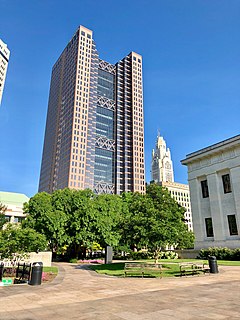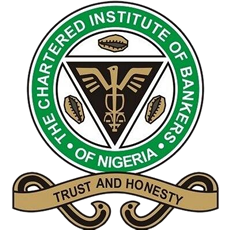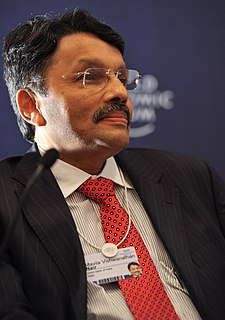Related Research Articles

The London Inter-Bank Offered Rate is an interest-rate average calculated from estimates submitted by the leading banks in London. Each bank estimates what it would be charged were it to borrow from other banks. The resulting average rate is usually abbreviated to Libor or LIBOR, or more officially to ICE LIBOR. It was formerly known as BBA Libor (for British Bankers' Association Libor or the trademark bba libor) before the responsibility for the administration was transferred to Intercontinental Exchange. It is the primary benchmark, along with the Euribor, for short-term interest rates around the world. Libor was phased out at the end of 2021, and market participants are being encouraged to transition to risk-free interest rates.

ICICI Bank Limited is an Indian multinational bank and financial services company headquartered in Vadodara. It offers a wide range of banking products and financial services for corporate and retail customers through a variety of delivery channels and specialized subsidiaries in the areas of investment banking, life, non-life insurance, venture capital and asset management.

The Community Reinvestment Act is a United States federal law designed to encourage commercial banks and savings associations to help meet the needs of borrowers in all segments of their communities, including low- and moderate-income neighborhoods. Congress passed the Act in 1977 to reduce discriminatory credit practices against low-income neighborhoods, a practice known as redlining.

The Office of the Comptroller of the Currency (OCC) is an independent bureau within the United States Department of the Treasury that was established by the National Currency Act of 1863 and serves to charter, regulate, and supervise all national banks and thrift institutions and the federally licensed branches and agencies of foreign banks in the United States. The acting Comptroller of the Currency is Michael J. Hsu, who took office on May 10, 2021.

The Banking Act of 1933 was a statute enacted by the United States Congress that established the Federal Deposit Insurance Corporation (FDIC) and imposed various other banking reforms. The entire law is often referred to as the Glass–Steagall Act, after its Congressional sponsors, Senator Carter Glass (D) of Virginia, and Representative Henry B. Steagall (D) of Alabama. The term "Glass–Steagall Act," however, is most often used to refer to four provisions of the Banking Act of 1933 that limited commercial bank securities activities and affiliations between commercial banks and securities firms. That limited meaning of the term is described in the article on Glass–Steagall Legislation.

Mark Walter Olson was an American economist and politician who served as a member of the Federal Reserve Board of Governors from 2001 to 2006. Filling an unexpired term to end on January 31, 2010, he resigned on June 21, 2006 in order to run the Public Company Accounting Oversight Board.

The American Bankers Association (ABA) is a Washington, D.C.-based trade association for the U.S. banking industry, founded in 1875. They lobby for banks of all sizes and charters, including community banks, regional and money center banks, savings associations, mutual savings banks, and trust companies. The average member bank having approximately $250 million in assets. ABA is considered the largest financial trade group in the United States.

Huntington Bancshares Incorporated is an American bank holding company headquartered in Columbus, Ohio. The company is ranked 521st on the Fortune 500, and is 26th on the list of largest banks in the United States.
This article is about the history of the United States Federal Reserve System from its creation to the present.
The New York State Banking Department was created by the New York Legislature on April 15, 1851, with a chief officer to be known as the Superintendent. The New York State Banking Department was the oldest bank regulatory agency in the United States.

The Chartered Institute of Bankers of Nigeria (CIBN) is the umbrella professional body for bankers in Nigeria. The CIBN was incorporated in 1976 as the Nigerian Institute of Bankers. It was chartered in 1990, and is now covered by the CIBN Act 5 of 2007. The Institute is authorized to control entry into the banking profession, to set standards for bankers and to maintain professional ethics through sanctions of erring members. Corporate members include the Central Bank of Nigeria, the Nigeria Deposit Insurance Corporation and all Deposit Money Banks, Development Banks, Mortgage Banks, Micro Finance Banks and Discount Houses in Nigeria.

Mavila Vishwanathan Nair is the Chairman of the Credit Information Bureau of India Limited, India's largest credit bureau. He is also an advisor select private equity and venture capital funded companies in India.

The Financial Stability Oversight Council (FSOC) is a United States federal government organization, established by Title I of the Dodd–Frank Wall Street Reform and Consumer Protection Act, which was signed into law by President Barack Obama on July 21, 2010. The Office of Financial Research is intended to provide support to the council.
Stephen Douglas Johnson (1963–2003), also known as Steve Johnson, was a Washington, D.C. banking lawyer; a chief lobbyist for the banking and insurance industries; U.S. House Chief Counsel for Financial Institutions and Consumer Credit from February 1995 to November 1997, the heyday of the Gingrich Revolution; and Bush Administration Senior Advisor to the Office of Federal Housing Enterprise Oversight (OFHEO) where among his varied duties he assisted the director Armando Falcon in the investigation of financial misconduct at Fannie Mae and Freddie Mac. Falcon was forced to resign in February 2003 by President George W. Bush for releasing critical oversight reports stemming from the investigation. The investigation and reports were harbingers of the worldwide financial crisis which was to occur. The forced resignation of Falcon led Johnson to resign immediately even though Bush eased up and allowed Falcon to finish his term.
This article details the history of banking in the United States. Banking in the United States is regulated by both the federal and state governments.
The Glass–Steagall legislation was enacted by the United States Congress in 1933 as part of the 1933 Banking Act, amended as part of the 1935 Banking Act, and most of it was repealed in 1999 by the Gramm–Leach–Bliley Act (GLBA). Its protections and restrictions had also been chipped away during most of its existence by lenient regulatory interpretations and use of loopholes. After Glass–Steagall's 1999 repeal, there was a great deal of discussion in the banking and securities industries, and among policymakers and economists, about the practical positive and negative changes to the business and consumer environment. Later, as financial crises and other issues played out in the United States and even worldwide, arguments have broken out about whether Glass–Steagall, as originally intended, would have prevented these issues.
Operation Choke Point was an initiative of the United States Department of Justice beginning in 2013 which investigated banks in the United States and the business they did with firearm dealers, payday lenders, and other companies believed to be at a high risk for fraud and money laundering.
Matthew H. ("Matt") Williams is a politician from the state of Nebraska in the Midwestern United States. In 2014, he was elected to the Nebraska Legislature, representing a district in the south central part of the state. Williams is a member of the Republican Party.
John Stinner is an American politician from Nebraska. In 2014, he was elected to the Nebraska Legislature, representing District 48 which includes Scotts Bluff County. Stinner is a member of the Republican Party.

Tri Counties Bank is a financial institution headquartered in Chico, California, which constitutes the consumer and business banking subsidiary TriCo Bancshares. The first branch opened in 1975 with 11 employees and $1 million in capital to serve the Butte, Glenn, and Tehama counties, giving it its name. As of 2021, the bank has over 75 branches in California, over 37,000 ATMs nationwide, and total assets of approximately $8 billion. A 2021 survey published in Forbes magazine of "America's Best In-State-Banks" ranked Tri Counties Bank as #2 in California.
References
- ↑ "View or download data for individual institutions - FFIEC Central Data Repository's Public Data Distribution" . Retrieved 2 October 2014.
- ↑ "BankFind Results". Federal Deposit Insurance Corporation (FDIC). Retrieved March 8, 2013.
- ↑ "Search Institutions".
- ↑ Blum, Julie (May 2, 2012). "Clark Lehr to head state banking group". Columbus Telegram. Retrieved March 8, 2013.
- ↑ "Meet Our Chairman". Nebraska Bankers Association. Retrieved March 8, 2013.
- ↑ "Archived copy" (PDF). Archived from the original (PDF) on 2006-10-05. Retrieved 2006-10-04.
{{cite web}}: CS1 maint: archived copy as title (link) - ↑ Jordan, Steve (August 2, 2012). "First Nebraska Bank acquires Heartland Community Bank". Omaha World Herald. Retrieved March 8, 2013.